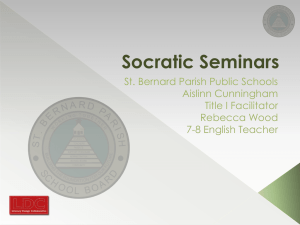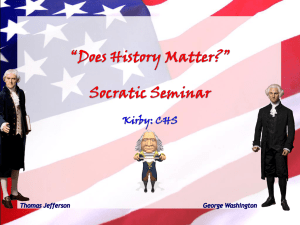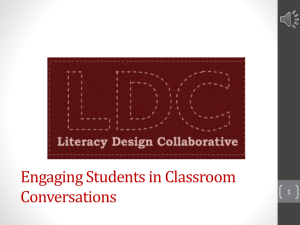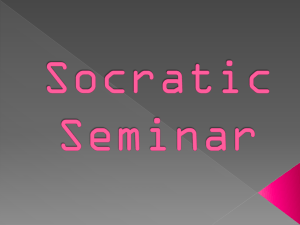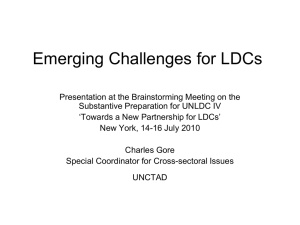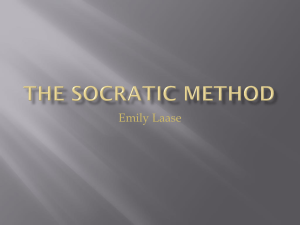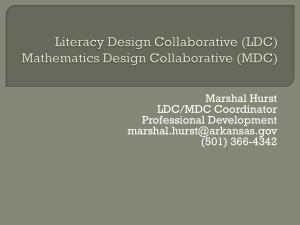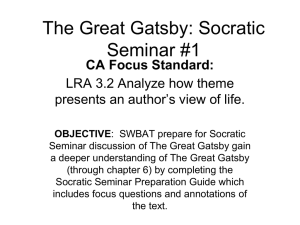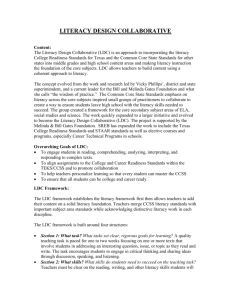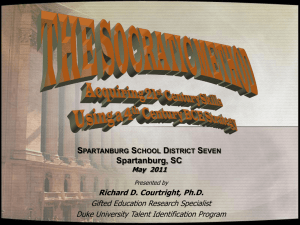Socratic Seminar
advertisement
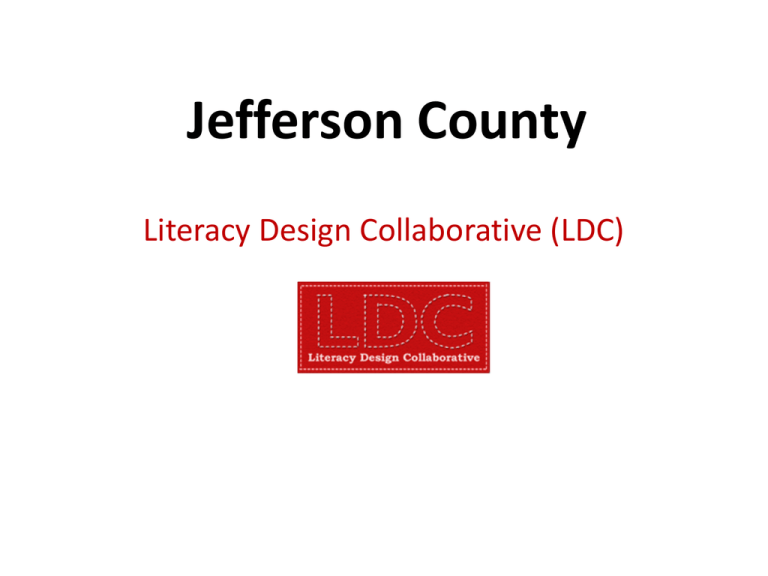
Jefferson County Literacy Design Collaborative (LDC) www.kellyphilbeck.com , Our on-going targets • I can describe the components of a Literacy Design Collaborate (LDC) module. • I can explain how LDC supports students’ content understanding. • I can access LDC resources to guide me in the process of developing and implementing a module. • I can implement literacy strategies in my classroom to support content understanding. LDC Framework TEMPLATE TASKS Target the 3 modes of writing in the Common Core State Standards Argument (opinion at the elementary grades) Informative/ Explanatory Teacher/StudentSelected Texts Narrative & other Common Core Standards when appropriate Appropriate, grade-level texts that support selected content Supported by an Instructional Ladder Skills students need to complete the task Mini-tasks for building each skill Build a Quality Instructional Ladder • • • • Preparing for the Task Reading Processes Transition to Writing Writing Processes Note-taking strategy - Flipbook Literacy Design Collaborative (LDC) (You will add your definition here.) Teaching Task Preparing for the Task Reading Process Transition to Writing Writing Process Transition to Writing Engaging ways to help students transition from reading to writing often collaboratively. Skill: Transition to Writing Mini-task: Analyzing Writer’s Craft Teaching Task Does the National Security Agency (NSA) infringe upon our rights or protect them? After reading NSA Surveillance Pros and Cons, Obama Defends Secret NSA Surveillance, Cheney Defends NSA , and other informational texts, write an article for your school publication that addresses the question and supports your position with evidence from the text(s). Be sure to acknowledge competing points of view. Skill: Transition to Writing Mini-task: Socratic Seminar • https://www.teachingchannel.org/videos/teach ing-the-n-word • Viewing lens: Structure of Socratic Seminar Socratic Seminar: Socratic Seminar: Expectations • We read and think about the text in advance. • We refer to the text and give enough time for fellow classmates to locate text. • We engage in conversation; we don’t talk at each other. • We show we are listening by tracking the speaker and summarizing what a classmate said. • We don’t raise our hand, but we wait for speaker to finish. • We ask questions, give comments, but always give evidence to support our opinions. 13 Follow-Up Questions • • • • • • • • • • Tell me more about that. What about the reading made you think that ___? Using evidence, convince us that __. In what other context does that idea play out? What evidence would you give to someone who thought ___? Based on what we have read, what do you think that we will discover in the next chapter? After reading this information, how would handle a situation like ___? How is your answer different or the same from others? So, this leads to you to what conclusions? What did you discover? Adapted from http://www.edutopia.org/blog/rethinking-whole-class-discussion-todd-finley 14 Socratic Seminar • It’s OKAY to disagree, so long as you do so respectfully – I understand what you are saying, but I disagree because… – I respect your opinion, but I disagree because… – I hear where you are coming from, but… • Most importantly, in a discussion there are no right or wrong answers. 15 Sentence Starters – – – – – – – – – – – 16 So what you’re saying is… I disagree/agree… I’d like to raise a question… I’m confused about… What is your opinion of… I think this means… What puzzles me is… This relates to… Do you agree/disagree…. Don’t you think this is similar to… I’d like to talk with people about… Socratic Seminar Does the National Security Agency (NSA) infringe upon our rights or protect them? 17 Readying for a Socratic Seminar Reviewing notes Reviewing roles Setting a goal 18 Sentence Starters – – – – – – – – – – – 19 So what you’re saying is… I disagree/agree… I’d like to raise a question… I’m confused about… What is your opinion of… I think this means… What puzzles me is… This relates to… Do you agree/disagree…. Don’t you think this is similar to… I’d like to talk with people about… Transition to Writing • • • • • • • Debate Socratic seminar 4 corners discussion Charting Discussion web ... ... Literacy Design Collaborative (LDC) (You will add your definition here.) Teaching Task Preparing for the Task Reading Process Transition to Writing Writing Process Writing Process Controlling idea Planning Development Revision Editing Completion Writing Process Scavenger Hunt • Divide into Content Groups: Science, Social Studies, ELA • Search for writing process strategies in exemplar modules: • www.literacydesigncollaborative.org • Instructional Ladder Resources www.kellyphilbeck.com • Create Content Charts of strategies Writing Process • • • • • • • Graphic organizers Outlines Peer response groups Peer editing Authentic publishing ... ... Time for Lunch! Comparison of Modules: • Analyze Economic Systems Modules—Original Draft & Revised Draft • Review Modules with Table Groups • Chart Top 5 Changes • Gallery Walk as Table Group • Checkmark next to Ideas you had on your list/Plus sign next to ideas you didn’t list LDC Module Workshop Semester-at-a-Glance LDC Module Workshop • www.kellyphilbeck.com • www.modulecreator.com • www.literacydesigncollaborative.org • www.rgroupspace.org • www.achievethecore.org (Close Reading Exemplars/Basal Alignment Project) Relax and debrief. What can you take away from today’s work that you can use now to build content understanding through literacy? Calendar Dates Lync Date: February 25 • 3:00 to 4:30 Jurying Modules: March 26 • 3:00-5:00 31

